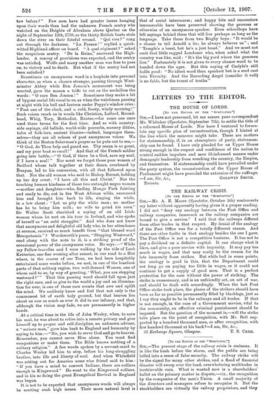THE RAILWAY CRISIS.
[TO TUE EDITOR OP THE -spscrwron.1
SIR,' Mr. A. E. Moore (Spectator, October 5th) controverts my letter without apparently having given it a proper reading. I did not "deny any analogy between the Post Office and railway companies, inasmuch as the railway companies are bound to give a service." I said that the railways differed from other trades in that respect. My denial of the analogy of the Post Office was for a totally different reason. And there are other faults in that analogy besides the one I gave. The Post Office is not a competitive business. It has not to pay a dividend on a definite capital. It can charge what it likes, and give a poor service with impunity. It may pay too much in wages, and that may easily be the reason for its late immunity from strikes. But while bad in some points, the analogy is good in this, that the Department could not long go on paying too little in wages, or it could not continue to get a supply of good men. That is a perfect protection for the men without the power of striking. The strike is unnecessary, and is an unfriendly act, an act of war, and should be dealt with accordingly. When the last Post Office strike took place, the places of the strikers should have been as far as possible permanently filled by blacklegs, just as I say they ought to be in the railways and all trades. If that is not enough, in the case of a Government service, vital to the community, an effective criminal punishment should be imposed. But the question of the moment is,—will the strike take place on the point of recognition, with Mr. Bell sup- ported by a hundred thousand men, or after recognition, with five hundred thousand at his back am, Sir, &c.,
21 Exchange Square, Glasgow. T. S. CREE.










































 Previous page
Previous page